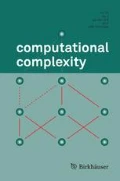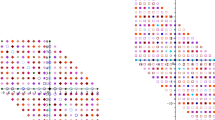Abstract.
Given a “black box” function to evaluate an unknown rational polynomial \(f \in {\mathbb{Q}}[x]\) at points modulo a prime p, we exhibit algorithms to compute the representation of the polynomial in the sparsest shifted power basis. That is, we determine the sparsity \(t \in {\mathbb{Z}}_{>0}\), the shift \(\alpha \in {\mathbb{Q}}\), the exponents \({0 \leq e_{1} < e_{2} < \cdots < e_{t}}\), and the coefficients \(c_{1}, \ldots , c_{t} \in {\mathbb{Q}} \setminus \{0\}\) such that
.
The computed sparsity t is absolutely minimal over any shifted power basis. The novelty of our algorithm is that the complexity is polynomial in the (sparse) representation size, which may be logarithmic in the degree of f. Our method combines previous celebrated results on sparse interpolation and computing sparsest shifts, and provides a way to handle polynomials with extremely high degree which are, in some sense, sparse in information.
Similar content being viewed by others
Author information
Authors and Affiliations
Corresponding author
Additional information
Manuscript received 31 October 2008
Rights and permissions
About this article
Cite this article
Giesbrecht, M., Roche, D.S. Interpolation of Shifted-Lacunary Polynomials. comput. complex. 19, 333–354 (2010). https://doi.org/10.1007/s00037-010-0294-0
Published:
Issue Date:
DOI: https://doi.org/10.1007/s00037-010-0294-0




